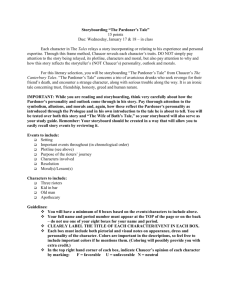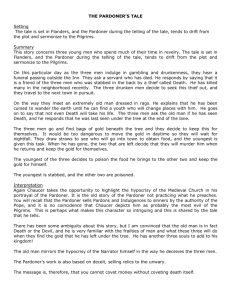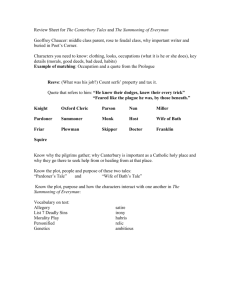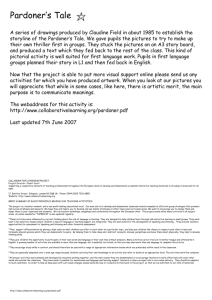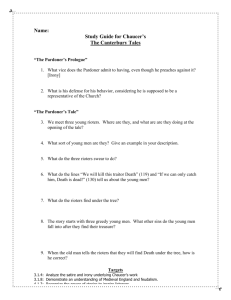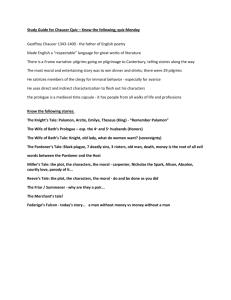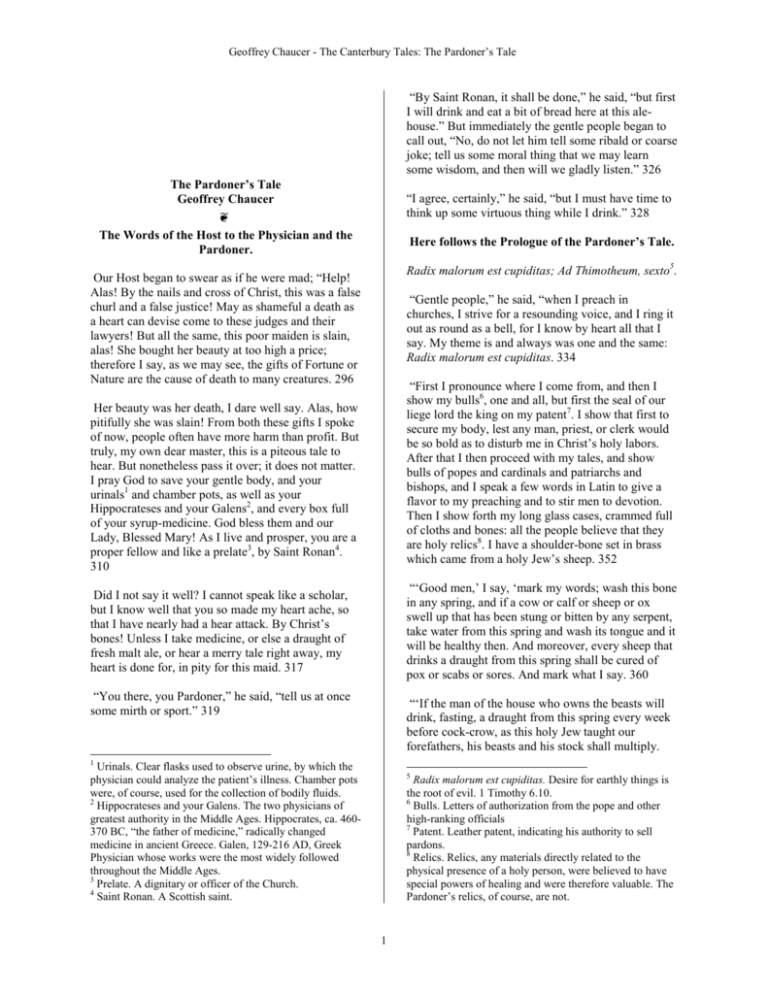
Geoffrey Chaucer - The Canterbury Tales: The Pardoner’s Tale
“By Saint Ronan, it shall be done,” he said, “but first
I will drink and eat a bit of bread here at this alehouse.” But immediately the gentle people began to
call out, “No, do not let him tell some ribald or coarse
joke; tell us some moral thing that we may learn
some wisdom, and then will we gladly listen.” 326
The Pardoner’s Tale
Geoffrey Chaucer
“I agree, certainly,” he said, “but I must have time to
think up some virtuous thing while I drink.” 328
❦
The Words of the Host to the Physician and the
Pardoner.
Here follows the Prologue of the Pardoner’s Tale.
Radix malorum est cupiditas; Ad Thimotheum, sexto5.
Our Host began to swear as if he were mad; “Help!
Alas! By the nails and cross of Christ, this was a false
churl and a false justice! May as shameful a death as
a heart can devise come to these judges and their
lawyers! But all the same, this poor maiden is slain,
alas! She bought her beauty at too high a price;
therefore I say, as we may see, the gifts of Fortune or
Nature are the cause of death to many creatures. 296
“Gentle people,” he said, “when I preach in
churches, I strive for a resounding voice, and I ring it
out as round as a bell, for I know by heart all that I
say. My theme is and always was one and the same:
Radix malorum est cupiditas. 334
“First I pronounce where I come from, and then I
show my bulls6, one and all, but first the seal of our
liege lord the king on my patent7. I show that first to
secure my body, lest any man, priest, or clerk would
be so bold as to disturb me in Christ’s holy labors.
After that I then proceed with my tales, and show
bulls of popes and cardinals and patriarchs and
bishops, and I speak a few words in Latin to give a
flavor to my preaching and to stir men to devotion.
Then I show forth my long glass cases, crammed full
of cloths and bones: all the people believe that they
are holy relics8. I have a shoulder-bone set in brass
which came from a holy Jew’s sheep. 352
Her beauty was her death, I dare well say. Alas, how
pitifully she was slain! From both these gifts I spoke
of now, people often have more harm than profit. But
truly, my own dear master, this is a piteous tale to
hear. But nonetheless pass it over; it does not matter.
I pray God to save your gentle body, and your
urinals1 and chamber pots, as well as your
Hippocrateses and your Galens2, and every box full
of your syrup-medicine. God bless them and our
Lady, Blessed Mary! As I live and prosper, you are a
proper fellow and like a prelate3, by Saint Ronan4.
310
“‘Good men,’ I say, ‘mark my words; wash this bone
in any spring, and if a cow or calf or sheep or ox
swell up that has been stung or bitten by any serpent,
take water from this spring and wash its tongue and it
will be healthy then. And moreover, every sheep that
drinks a draught from this spring shall be cured of
pox or scabs or sores. And mark what I say. 360
Did I not say it well? I cannot speak like a scholar,
but I know well that you so made my heart ache, so
that I have nearly had a hear attack. By Christ’s
bones! Unless I take medicine, or else a draught of
fresh malt ale, or hear a merry tale right away, my
heart is done for, in pity for this maid. 317
“You there, you Pardoner,” he said, “tell us at once
some mirth or sport.” 319
“‘If the man of the house who owns the beasts will
drink, fasting, a draught from this spring every week
before cock-crow, as this holy Jew taught our
forefathers, his beasts and his stock shall multiply.
1
Urinals. Clear flasks used to observe urine, by which the
physician could analyze the patient’s illness. Chamber pots
were, of course, used for the collection of bodily fluids.
2
Hippocrateses and your Galens. The two physicians of
greatest authority in the Middle Ages. Hippocrates, ca. 460370 BC, “the father of medicine,” radically changed
medicine in ancient Greece. Galen, 129-216 AD, Greek
Physician whose works were the most widely followed
throughout the Middle Ages.
3
Prelate. A dignitary or officer of the Church.
4
Saint Ronan. A Scottish saint.
5
Radix malorum est cupiditas. Desire for earthly things is
the root of evil. 1 Timothy 6.10.
6
Bulls. Letters of authorization from the pope and other
high-ranking officials
7
Patent. Leather patent, indicating his authority to sell
pardons.
8
Relics. Relics, any materials directly related to the
physical presence of a holy person, were believed to have
special powers of healing and were therefore valuable. The
Pardoner’s relics, of course, are not.
1
Geoffrey Chaucer - The Canterbury Tales: The Pardoner’s Tale
And sirs, it will cure jealousy also; though a man be
fallen into a jealous fury, mix his broth with this
water and he will never mistrust his wife again, even
if he knows the very truth of her fault--although she
has taken two or three priests. 371
unpleasant things to us, and thus I spit out my venom
under the guise of holiness, seeming holy and
faithful. I say again, in a few words, I preach for no
motive but avarice from which my theme is and
always was, Radix malorum est cupiditas. Thus can I
preach against that same vice which I practice,
avarice. But though I may be guilty of it, I can make
other people depart from avarice and repent sorely.
But that is not my primary purpose; I preach for
nothing but greed; and this should suffice for this
matter. 434
“‘Here is a glove also. He who will put his hand in
this glove shall see his grain multiply, whether it is
wheat or barley; so he will offer pence, or else
groats9. 376
“‘But, good men and women, of one thing I warn
you; if any person is now in this church who has
committed a horrible sin and dares not to be
confessed of it because of shame, or if any woman,
old or young, has made her husband a cuckold, such
people shall have no power or grace to make
offerings here to my relics. But whoever knows
himself to be free from such fault, let him come up
and make an offering in the name of God, and I will
absolve him by the authority granted me by bull.’ 388
“Then I tell them many examples from old stories of
long ago. For simple people love old tales; such
things they can well remember and repeat. 438
“What! Do you think that so long as I can preach and
gain gold and silver through my teaching that I shall
live in poverty willingly? 441
“Nay, nay, truly I never thought of it! I will preach
and beg everywhere I go; I will not labor with my
hands nor make baskets to live by, only because I
will not be an idle beggar. I will imitate none of the
apostles. I will have wool, wheat, cheese, and money,
were it given by the poorest lad or widow in a
village, though her children pine and starve! I will
have a merry wench in every town and drink liquor
from the vine. 453
“With this trickery I have won a hundred marks, year
by year, since I have been a pardoner. I stand like a
cleric in my pulpit, and when the lay people are
seated I preach as you have heard and tell a hundred
more false stories. Then I take pains to stretch out my
neck and bob my head east and west over the people,
like a dove perched upon a barn. My hands and
tongue move so briskly that it is a joy to see my
movement. 399
“But listen, gentle people, in conclusion. Your will is
that I tell a tale. Now that I have drunk a good
draught of malty beer, by the Lord I hope I shall tell
you a thing that ought by reason to be to your liking.
For though myself be a vicious man, yet I know how
to tell you a moral tale which I am wont to tell in my
money-getting homilies. Now hold your peace, and I
will begin.” 462
“All my preaching is about avarice and such cursed
things, to make them generous in giving their pence
and especially to me. My aim is all for gain and not at
all for the correction of sin. I do not care, when they
are buried, even if their souls have gone
blackberried10! 406
Here begins the Pardoner’s Tale.
“Surely, many sermons arise from an evil intention,
how to please and flatter people, to aim for
promotion through hypocrisy, from vain glory and
some from hate. For when I dare not otherwise
dispute with someone, then I sting him with my bitter
tongue as I preach, so that he cannot escape being
falsely defamed, if he has trespassed against me or
my brethren. For though I do not mention his name,
people shall know whom I mean by hints and other
circumstances. Thus I pay back people who do
Once there dwelt in Flanders a company of young
people who made a habit of folly, such as
debauchery, gambling11, brothels, and taverns, where
with harps, lutes and citterns12 they danced and
played at dice day and night, and ate and drank more
than they could, through which they did service to the
Devil by unnatural excess within those Devil’s
temples. 471
9
Pence . . . groats. I.e., one small coin or another.
Blackberried. Though this phrase is usually glossed as
“going blackberry picking,” the phrase clearly means more.
The Pardoner does not care about the condition of their
souls after death, whether they are pure white or black as a
blackberry.
10
11
Gambling. Throughout the tale, the term “gambling” is
used for Chaucer’s “hasardrye,” which refers to gambling
in general, but may at times refer to the specific game of
dice known as Hazard.
12
Citterns. Guitar-like instruments.
2
Geoffrey Chaucer - The Canterbury Tales: The Pardoner’s Tale
Their oaths were so great and so damnable that it
was grisly to hear them swear; they tore our blessed
Lord’s body into pieces anew (as if the Jews had not
torn him enough), and each laughed at the others’
sins. And then came graceful and slim dancing girls,
young girls selling fruit13, singers with harps, pimps
and confectioners, who are all true officers of the
Devil to kindle and blow that fire of lust, which is
allied to gluttony. I take Holy Scripture as my
witness that lechery is in wine and drunkenness. 484
The apostle, weeping, says piteously, “There walk
many of whom I have told you, and I say it now
weeping and with a piteous voice, they are enemies
of the cross of Christ, their end is death; their god is
their belly18.” O belly! O stinking bag! Full of
corruption! What a labor and cost it is to provide for
you! How these cooks pound and strain and grind,
and turn substance into accident19, to satisfy all your
greedy taste! Out of the hard bone they knock the
marrow, and cast away nothing that may go through
the gullet soft and sweet. The glutton’s delicious
sauce is made of spices from the leaf, bark, and root
and leaf, to get him ever a new appetite. But he that
follows after such delights, surely, is dead while he
lives in those vices. 548
Lo, how drunken Lot14, against nature, lay with his
daughters, unwittingly; he was so drunk he knew not
what he did. 487
Herod15 (let any one look up the history), when he
was full of wine at his feast, gave the command at his
own table to slay the Baptist John, guiltless. 492
Wine is a lecherous thing, and drunkenness is full of
wretchedness and of contention. O drunken man,
your face is disfigured: your breath is sour, you art
foul to clasp in arms, and the sound through your
drunken nose seems as if you always said, “Samsoun, Sam-soun!” And yet Samson20 never drank
wine, God knows. 555
Seneca16, doubtless, also says a good word; he says
he can find no difference between a man that is out of
his mind and a man who is addicted to drink, except
that madness, when it attacks a wretched creature,
endures longer than drunkenness. O gluttony, full of
cursedness! O first cause of our ruin! O origin of our
damnation, until Christ redeemed us with His blood!
501
You fall like a stuck pig, your tongue is lost, and so
to is your sense of decency, for drunkenness is the
very tomb of man’s wit and discretion. He over
whom drink has power can keep no secret, surely.
Now keep yourself away from the wine white and
red, and chiefly from the white wine of Lepe21 for
sale in Fish Street, or Cheapside22. This Spanish wine
insidiously creeps through other wines growing
nearby, and such fumes arise from it that after two or
three sips, though a man think himself to be at home
in Cheapside, he is at the town of Lepe in Spain, not
Lo, how dearly was this cursed sin paid for! This
whole world was ruined by gluttony! Our father
Adam and his wife in truth were driven from Paradise
to labor and woe for that vice. For while Adam
fasted, I say, he lived in Paradise, and when he ate of
the forbidden fruit of the tree, he was cast out to woe
and pain. O gluttony, well may we accuse you! If a
man only knew how many maladies follow from
gluttony and excess, he would be more moderate in
his diet as he sits at table. 516
Alas! The short-lived pleasure of swallowing, the
delicate mouth, causes men everywhere, east, west,
north, and south, labor in every way, with earth, air,
and water, to get fine meat and drink for a glutton.
On this, O Paul, well can you explain: ‘Meat into the
stomach and stomach also to the meat, God shall
destroy both17,” as Paul says. Alas! It is foul to say,
by my faith, but fouler is the act, when a man drinks
so of the white and red that he makes a toilet of his
throat through this accursed excess. 528
18
Their god is their belly. See Philippians 3.18-19.
Turn substance into accident. Turn that which is meant to
sustain the body into something that is meant to be a
delicacy. The Pardoner uses the philosophical terms
“substance” (the essence or true purpose of the thing) and
“accident” (the external form of the thing) to further his
argument that eating fine gourmet food is a form of
gluttony, while eating simple food is acceptable behavior.
20
Samson. Old Testament Israelite strongman whose
strength was in his hair (or his promise to God that he
would not cut his hair). When his hair had grown again,
after Delilah betrayed him and cut it off, he knocked down
the temple pillars, killing his enemies (the Philistines) and
himself. The story of his troubles with Delilah is told in
Judges 16. 15 and retold in the Monk’s Tale 2015-94.
21
Lepe. Town in Spain, or the vineyard district surrounding
it, near Cadiz.
22
In Fish Street, or Cheapside. In London.
19
13
Girls selling fruit. This is sometimes a metaphor for
prostitutes, or at least the occupations at times coincided.
14
Lot. See Genesis 19. 30-38.
15
Herod. See Matthew 14.1-12.
16
Seneca.
17
God shall destroy both. See 1 Corinthians 6.13.
3
Geoffrey Chaucer - The Canterbury Tales: The Pardoner’s Tale
at Rochelle nor at Bordeaux23; and then he will say,
“Sam-soun, Sam-soun!” 572
Now I will speak a word or two about false and
frequent oaths, which old books discuss. Violent
swearing is an abominable thing, and frequent
swearing is still more reprehensible. The almighty
God, as Matthew witnesses, forbade swearing
entirely26; but especially the holy Jeremiah says of
swearing, “You shall say your oaths in truth, and not
lie, and swear in judgment and righteousness27.” 637
But listen to one word, I ask you, gentle people; the
supreme acts of victory in the Old Testament, I dare
say, were done through the help of the true
omnipotent God in abstinence and prayer. Look into
the Bible and there you may see it. Look too at Attila,
the great conqueror, who died in shame and disgrace,
bleeding at his nose in a drunken sleep. A great
captain should live soberly. And furthermore,
consider very carefully what was commanded to
Lemuel-- not Samuel24, I say, but Lemuel. Read the
Bible and find it expressly set down as to giving wine
to them that have oversight of justice. But no more
now, for this may suffice. 588
And idle swearing is a wicked thing. Behold how on
the first table of the almighty God’s glorious
commandments28 the second commandment is, “Take
not my name in vain or amiss.” Lo, He forbids such
swearing before He forbids homicide or many other
cursed things. I say that this is the order in which the
commandments stand; anyone knows who
understands His commandments, knows why it is the
second commandment. 647
Now that I have spoken of gluttony, I will forbid
gambling to you, which is the very mother of lies,
deceit, and cursed perjuries, of blasphemy of Christ,
manslaughter, and waste of money and of time; and
furthermore, it is a disgrace and against all honor to
be known as a common gambler. And the higher a
man’s estate, the more abandoned he is considered to
be. If a prince practices gambling, he will be held
lower in reputation in all government and political
affairs, by common opinion. 602
And furthermore, I tell you flatly that vengeance will
not depart from the house of one who is too
outrageous in his oaths. “By God’s precious heart,”
and “By His nails” and “By the blood of Christ in the
abbey of Hales29, my chance is seven; yours is five
and three!” “By God’s arms, if you play falsely, this
dagger shall go through your heart!” This is the fruit
that comes of the two cursed dice: perjury, anger,
dishonesty, murder. 657
Stilbon25, the wise ambassador, was sent to Corinth
in great pomp from Lacedaemon to make an alliance;
and when he came he happened to find all the
greatest men of that land gambling. For this reason,
as soon as he could, he went home again to his
country and said, “I will not lose my good name
there, nor will I take on me such a shame as to ally
you to gamblers. Send other wise ambassadors; for
by my word I would rather die than ally you with
gamblers.” For you who are so glorious in honors
shall not be allied with gamblers by my will, or treaty
of my making.” Thus spoke this wise philosopher.
620
Now for the love of Christ Who died for us, forsake
your oaths, great and small. But, sirs, I will now tell
my tale. These three rioters of whom I speak, long
before any bell had rung for prime30, were sitting in a
tavern to drink. And as they sat, they heard a bell
tinkle that was carried before a corpse to his grave.
One of them called to his servant, “Go quickly,” he
said, “and ask without delay what corpse passed by
here, and see that you report his name correctly.” 669
Note also how the king of the Parthians, as the book
tells us, sent in scorn a set of golden dice to King
Demetrius because he had practiced gambling. For
this reason the king of the Parthians held King
Demetrius’ glory and renown to be of no value.
Lords may find other kinds of virtuous diversion to
pass the day with. 628
“Sir,” said the boy, “there is no need. It was told to
me two hours before you came here; he was an old
friend of yours, by God, and he was slain suddenly in
the night, as he sat very drunk on his bench. A
stealthy thief that men call Death, who slays all the
people in this country-side, came with his spear and
struck his heart in two, and went his way without a
word. He has slain a thousand in this pestilence; and
master, before you come before him, it seems to me
23
26
Rochelle nor at Bordeaux. Regions in France producing
fine wine.
24
to Lemuel-- not Samuel. Lemuel, biblical king of Massa.
Samuel: last of the judges of Israel, who anointed the Saul
as the first king of Israel and later David as his successor.
See Proverbs 31.4-5.
25
Stilbon. Perhaps a Greek philosopher.
As Matthew witnesses. See Matthew 5.36.
Righteousness. See Jeremiah 4.2.
28
Commandments. I.e., the ten commandments.
29
Abbey of Hales. In Gloucestershire, which claimed to
have a vial of Christ’s blood, which was said to be visible
only to those who were pure in heart.
30
Prime. 9 am.
27
4
Geoffrey Chaucer - The Canterbury Tales: The Pardoner’s Tale
that you would be best if you were wary of such an
adversary. Be ready to meet him at all times; my
mother taught me this. I can say no more. 684
But sirs, it is not a courteous thing to speak rudely to
an old man, unless he should trespass in act or word.
You may read yourselves in Holy Scripture, “Before
an old hoary head man you shall arise32.” For this
reason I counsel you, do no harm now to an old man,
no more than you would like it to be done to you in
your old age, if you remain so long. And now God be
with you, wherever you may walk or ride; I must go
where I have to go. 749
“The child speaks the truth, by Blessed Mary,” said
the tavern-keeper, “for over a mile from here, in a
large village, he has slain both man and woman,
child, servant, and page. I believe his habitation to be
there. It would be a bit of great wisdom to be
forewarned before he does him great dishonor.” 691
“Nay, old churl, not so fast, by God,” said this
second gambler without delay. “By St. John, you
shall not depart so easily! You spoke just now of that
traitor Death who slays all our friends in this countryside. By my word, you are his spy! Tell where he is,
or, by God and the Holy Sacrament, you shall pay for
it. Truly you are in conspiracy with him to slay us
young people, false thief.” 759
“Yes, by God’s arms!” said this reveler, “Is it really
such peril to meet with him? I vow to God’s bones I
will seek to meet him in the highways and the
byways. Listen, friends, we three are all one in this;
let each of us hold up his hand and become the
others’ brother, and slay this false traitor Death. He
shall be slain before night that slays so many, by
God’s dignity!” 701
“Now sirs,” he said, “if you are so glad to find
Death, turn up this crooked path; for by my faith I
left him in that grove under a tree, and there he will
wait, and for all your boasting will he hide. Do you
see that oak? There you shall find him. May God,
Who redeemed mankind, save you and amend you!”
Thus spoke this old creature. 767
These three pledged their word together, each to live
and die for the rest as if he were their sworn brother,
and up they all started in this drunken fury, and forth
they went toward that village of which the tavernkeeper had spoken; and they swore many grisly
oaths, and Christ’s blessed body they rent to pieces-Death shall be dead if they can catch him! 710
And each of these revelers ran until he came to that
tree, and there they found nearly eight bushels, as it
seemed to them, of florins coined of fine round gold.
They no longer sought then after Death, but each was
so glad at the sight, for the florins were so beautiful
and bright, that they sat themselves down by this
precious hoard. 775
When they had gone only a little way, just as they
were climbing over a fence, an old and poor man met
them, and greeted them meekly, and said, “Now,
gentle people, God be with you!” 715
The proudest of these three revelers answered,
“What, churl, bad luck to you! Why are you
completely wrapped up except your face? Why live
you so long to such a great age?” 719
This old man began to peer into his face, and said,
“Because I cannot find a man, even if I should walk
from here to India, in city or in village, who will
exchange his youth for my age. And therefore I must
keep my old age as long as it is God’s will. Alas,
death will not take me! Thus I walk, a restless
wretch, and thus day and night I knock with my staff
upon the ground, which is my mother’s gate, and say,
“Dear mother, let me in. Lo, how I vanish away, flesh
and skin and blood! Alas, when shall my bones be at
peace? Mother, I would exchange my chest with
you31, which has been long time in my chamber, yes,
for a hair-cloth shroud to wrap myself in!” But still
she will not do me that favor; wherefore my face is
pale and withered. 738
The worst of them spoke the first word. “Brethren,”
he said, “heed what I say; though I jest often and
make sport, I have a good mind. Now Fortune has
given us this treasure so that we may live the rest of
our lives in mirth and jollity, and as easily as it
comes, so too we will spend it. Ah! God’s precious
dignity! Who would have thought today that we
should have so wonderful a grace! Could this gold be
but carried from here to my house or else to yours-for you know well all this gold is ours--then would
we be in great joy. But truly it may not be done
during the day. People would call us harsh thieves
and hang us for our own treasure. It must be carried
by night, as wisely and slyly as can be. Therefore I
advise that we draw straws among us all, and he that
draws the shortest shall run with a happy heart to the
town and do so quickly, and secretly bring us wine
and bread. And two of us shall secretly guard this
31
32
My chest. I.e., his chest containing valuables.
5
You shall arise. See Leviticus. 19.32.
Geoffrey Chaucer - The Canterbury Tales: The Pardoner’s Tale
amount of a grain of wheat of this compound without
dying immediately. Yes, he shall die, and will do so
in less time than you can walk a mile, this poison is
so violent.” 867
treasure, and at night, if he does not delay, we will
carry it where we all agree is safest.” 801
One of them brought the straws in his fist and told
them to draw, and see where the lot would fall. It fell
to the youngest of them and he went forth without
delay toward the town. As soon as he was gone, the
second said to the third, “You well know you are my
sworn brother, and now I will tell you something to
your advantage. Here is a great abundance of gold to
divide among the three of us; and you know well our
friend is gone. Now if I can plan it so that it will be
divided among the two of us, will I not have done
you a friendly turn?” 815
This cursed man gripped the box of poison in his
hand, and then ran into the next street to a shop and
borrowed three large bottles. Into two of them he
poured his poison, but the third he kept clean for his
own drink, for he planned to labor all night long
carrying away the gold. And when this reveler (may
the Devil take him!) had filled his three great bottles
with wine, he returned again to his friends. 878
What need to describe it more? For just as they had
planned his death, even so they slew him, and did so
quickly. When this was done, one of the two said,
“Now let us sit and drink and make merry, and then
we will bury his body.” 884
“I do not know how that can be,” the other answered.
“He knows the gold is left with us two. What shall
we do? What shall we say to him?” 817
“Shall it be a secret?” said the first villain. “I shall
tell you in few words what we shall do to carry it out
successfully.” 821
And with that word he happened to take one of the
bottles where the poison was, and he drank and gave
his friend a drink also. Therefore, they both died
soon. And surely Avicenna33 never wrote in any
canon or any chapter more wondrous signs of
poisoning than these two wretches showed before
they died. Thus these two murderers met their end,
and the false poisoner also. 894
“I agree,” said the other, “not to betray you, by my
word.” 823
“Now,” said the first, “you know well we are two
and that two shall be stronger than one. See to it that
when he is set down; you will arise and scuffle with
him as in sport, and I will pierce him through the two
sides, and you will see to it that you do the same with
your dagger. And then shall all this gold be shared
between you and me, dear friend. Then may we both
fulfill all our desires, and play at dice at our own
pleasure.” And thus were these two villains agreed to
slay the third, as you have heard me say. 836
***
“O cursed sin34, full of cursedness! O treacherous
homicide! O wickedness! 896
“O gluttony, lust and gambling! You blasphemer of
Christ with insult and great oaths, habitual and proud!
Alas mankind, how may it be that you art so false and
unkind to your Creator, Who made you and redeemed
you with His precious heart’s blood, alas! 903
The youngest, going to the town, turns over and over
in his heart the beauty of those bright new florins. “O
Lord,” he said, “if only I could have all this treasure
to myself, no man living under God’s throne should
live as merry as I!” And at last the fiend, our enemy,
put it into his mind to buy poison with which to slay
his two friends; for the fiend found him in such a way
of life that he had permission to bring him to ruin, for
utterly his full purpose was to slay them both and
never to repent. And he went forth without delay into
the town to an apothecary, and asked him to sell him
some poison so that he might kill his rats; and there
was a pole-cat in his yard, he said, which had killed
his capons, and he would gladly avenge him upon the
pests that ruined him by night. 858
“Now, good men, God forgive you your trespasses
and guard you from the sin of avarice. My holy
pardon will cure you all, provided that you offer
nobles and other sterling coin, or else silver rings,
brooches, spoons. Bow your heads, bow them under
this holy bull! Come up, wives, offer of your wool!
See, I enter your name here in my roll; you shall
enter into heaven’s bliss; I absolve you by my high
33
Avicenna. Eleventh-century Arab (Persian) physician,
who compiled the important treatise on medicine, “The
Book of the Canon of Medicine.”
34
O cursed sin. Though there is no formal break in the
manuscripts, the tale is clearly finished and the Pardoner’s
address to the other pilgrims begins. Thus the convention of
adding quotation marks for the speech of the characters
resumes here.
“And you shall have such a thing,” answered the
apothecary, “that, so may God save my soul, no
creature in all this world who can eat or drink the
6
Geoffrey Chaucer - The Canterbury Tales: The Pardoner’s Tale
power, you that will make offerings, as clear and
clean as when you were born. Lo, sirs, thus I preach).
And may Jesus Christ, our soul’s physician, grant
that you may receive His pardon; for that is better
than mine, I will not deceive you. 918
is so dear to me, kiss the Pardoner. And Pardoner, I
pray you draw near again, and let us laugh and make
sport as we did before.” 967
“But sirs, one word I have forgotten to say. Here in
my bag I have relics and indulgences, as fair as any
man’s in Britain, which were given to me by the
pope’s own hand. If any of you of devotion will make
an offering and have my absolution, come forth now
and kneel down here and meekly receive my pardon;
or else take pardons all new and fresh as you go
along, at every town’s end, so that you offer again
and again nobles and pence which are good and
sound. It is an honor to every creature here to have a
competent pardoner to absolve you as you ride
through the lonely country, in case of a misadventure
which might happen. 934
Here is ended the Pardoner’s Tale.
And without delay they kissed and rode on. 968
Translated and Edited by Gerard NeCastro
© Copyright, 2007, All Rights Reserved
Citation. Chaucer, Geoffrey. The Pardoner’s Tale.
NeCastro, Gerard, ed. and trans. eChaucer:
http://www.umm.maine.edu/faculty/necastro/chaucer
“By chance one or two may fall down from their
horses and break their necks in two. Look what a
security it is to you all that I, who can absolve you
all, high and low, when the soul shall pass from the
body, fell into your company! I advise that our Host
here be the first, for he is most enveloped in sin. 942
“Come forth, Sir Host, and offer first, and you shall
kiss all the relics, yes, for a groat35; without delay
unbuckle your purse.” 945
“No, no!” he said, “may I have the curse of Christ if
I do so!” he said. “Leave me alone; it shall not be, I
swear. You would make me kiss your old breech and
swear it is a saint’s relic, no matter how foul it may
be! But by the Holy Cross that St. Helen36 found, I
wish I had your testicles in my hand instead of relics
or a sanctuary37. Let them be cut off, and I will help
you carry them. They shall be enshrined in a hog’s
turd!” 953
This Pardoner answered not a word; he was so
angry, he would not speak. 955
“Now,” said our Host, “I will not talk with you
longer, nor with any other angry man.” 957
But when the worthy Knight saw all the people
laughing, he said, “Enough, no more of this. Sir
Pardoner, be cheerful, and I pray you, Sir Host, who
35
Groat. Small coin.
St. Helen. Mother of the Emperor Constantine, who was
believed to have miraculously found the Holy Cross on
which Christ was crucified.
37
Sanctuary. Box for holding relics.
36
7


